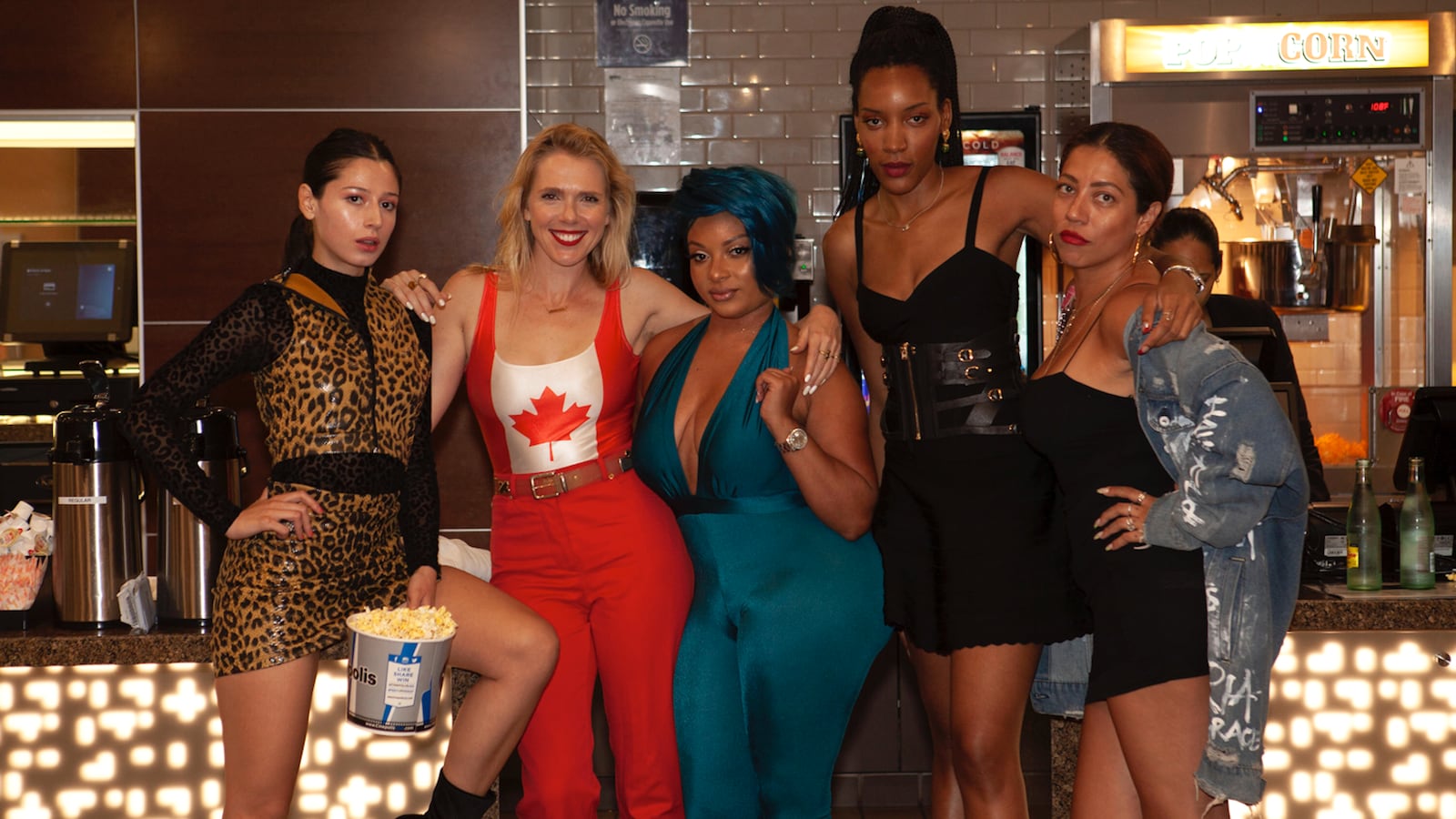It’s 10:30 pm on a Thursday and I’m watching Jacq the Stripper place dollar bill after dollar bill into the lime-green thong of a stripper at the Show Palace club in Long Island City. The stripper-comedian-activist was at this club a few months ago, when it was the film set for Hustlers, a movie based on the New York magazine article about a band of strippers who drugged their Wall Street clients to steal their money. Jacq, whose Instagram and website sells T-shirts and artwork that say things like “tip her” and “I want you to overcome your whoreophobia,” was hired as a consultant for the movie and has a brief cameo where J.Lo grabs her boobs. “I participated in this project because I wanted to be fondled by J.Lo,” she says about that experience.
Fifteen feet above Jacq’s head, another stripper has her red glitter pumps firmly planted on the ceiling as she twerks upside-down Spider-Man style before sliding headfirst down the pole at rocket speed. If the dancer miscalculates, she could easily fall and crack open her skull. It’s a feeling of precariousness that Jacq can relate to. This week is the premiere of Hustlers and the stakes are high for Jacq. She is anxious about what her peers in the sex worker community will think and also about the message the film will portray to “civilians,” the label strippers sometimes use for non-strippers.
For weeks, strip club locker rooms have been abuzz with debates about the movie. Was it exploitative or was it bringing the stripper narrative into the mainstream? Many sex workers wanted to know why Hollywood gets to portray sex workers’ stories while actual sex workers are censored on social media all the time. Strippers like Jacq have been affected by the controversial bill package FOSTA-SESTA—ostensibly meant to prevent sex trafficking online—which has shut down many sex worker’s social media profiles, forcing them offline and into overcrowded clubs. It’s exacerbating the problems of discrimination, racism, and abuse that sex workers have faced at the hands of both managers and their clients since time immemorial.
Just a few hours earlier, Jacq stood in front of the Cinepolis cinema in Chelsea, waiting for a girl squad of five sex workers to go see Hustlers for the first time. The squad tonight is a premier selection of New York’s sex-worker-activist elite. There is Gizelle Marie, an activist for the black stripper community and one of the leading voices of last year’s stripper strike; Valley Latini, a singer-songwriter-stripper whose hit is “Pay My Rent”; SX Noir, a self-described “thot leader” and advocate for sex workers; and ButterflyMush, a stripper turned artist who’s wearing a bag she painted herself that says “girls just want to have funds.” As they walk with buckets of popcorn and chocolate mint candies wearing bondage-themed belts, lucite heels, and cheetah print, they look the sex-worker edition of the Spice Girls.
As the previews play, Gizelle Marie casually counts a wad of cash as she tells me that she didn’t even want to see the movie because she’s traumatized by how the media represents sex workers and was doubtful Hustlers would be any different. The story of the stripper, she tells me, “is either glamorized or goes into this, What trauma happened to you? What did your daddy do to you?-type narrative.” she says, “It’s a lot more complicated than that.”
When the movie begins, Gizelle shrieks: “Oh my God is that the manager of Show Palace?” She would know—Gizelle began stripping at 18 at Sin City in the Bronx and has worked in pretty much every club in New York since. Over the years, she’s become so outspoken against the pervasive racism and body-shaming in clubs that many have banned her from working.
Gizelle’s eyes widen as she watches the movie, and she keeps gripping my hand and telling me, “That’s accurate!!” There's a montage of scenes she relates to: a stripper talks about not even wanting to have sex with her boyfriend by the time she gets home from work; a client can’t stop asking about a stripper’s daddy issues; another stripper gets chewed out by a jealous boyfriend; a manager takes a larger cut of a stripper’s salary than he promised; and Constance Wu’s character barely takes home any money after she splits it with the DJ, security, the bartender, and the house mom.

At one point J.Lo’s character says, “This whole country is a strip club. You got people tossing the money and people doing the dance.” “Now that is the real truth,” says Gizelle. In the next scene, it’s a cold night on the strip-club roof and J.Lo wraps Constance Wu’s character in her fur coat. “Alright, that’s not true! Strippers are not that nice to each other!” says Gizelle. “I mean, I am! But not everybody is and we should be if we want to move ahead.”
I look over and see that Valley Latini is sobbing. On screen, J.Lo is cutting the string of a tampon for the young and vulnerable character of Lili Reinhart as Reinhart cries on the floor, telling J.Lo that her family stopped talking to her when they found out she’s a stripper. “It’s just so real and relatable,” Latini tells me afterwards. “I didn’t expect it to be so emotional. It’s just so amazing to see our struggles being told up on the big screen like that.”
Afterwards, we pile into ButterflyMush’s car and head to the strip club—but first, she removes her son’s car seat so we can all climb in the backseat. ButterflyMush knew the girls who the movie is based on and partied with them in Vegas. The movie doesn’t follow their plot line exactly, but there are some parts ButterflyMush recognizes as true: “That part in the movie where girls try to copy them? I saw that happen, that’s true.”
Hustlers shows how much harder the industry became for strippers after the 2008 stock market crash and the lengths some were willing to go to survive. As we cross the Queensboro Bridge, SX Noir leans in and sums it up: “Hustlers is really about the redistribution of wealth. Sure it is empowering, but really this movie is about surviving under capitalism post-2008 financial crash.” SX Noir says that much of the time, clients are stingy in compensating sex workers for the emotional labor they provide, in addition to the physical. “I hope that people who watch this see that it takes work to be a stripper. It takes talent, skill and business smarts. It is work, these women are out here working.”
When we get to the club, a girl in a blue wig comes over and throws her arms around Jacq. “I go on your page all the time when I need inspiration,” she says before bursting into tears. “It’s just so fucking hard. I worked 6 hours in the VIP room last week and barely made any money.” This is true especially when you’re a black stripper. “These clubs will say they’re not racist but you go for auditions and they never call you back,” she says. “I gotta stop crying it’s fucking up my eyelashes.”
“You see what I’m talking about?” says Gizelle Marie. “The struggle is real. We need more spaces that are inclusive of all colors and body types.” Later in the night, a girl comes over to Gizelle Marie: “I had to meet you in person, you’re the reason I got into stripping.” For the girls in this club, Jacq and Gizelle, who have risked their careers to speak up on stripper’s issues, are heroes.

Jacq is holding a glass of champagne in one hand and a clear purse that shows off a huge wad of cash inside it. She wants to spend all of it tonight to redistribute the money the strippers lost out on during the week the club was closed for Hustlers’ filming. Sitting in a leather chair holding a fat stack of bills is Lorene Scafaria, the director and writer of Hustlers. “We had auditions and hired some of them,” she tells me. “I wish we could have hired all the girls.” I ask her how she is feeling about the community’s reactions to the movie. “I was really nervous for the girl’s reactions. It’s so sensitive telling a story about a community and I wanted to do it right, ” she muses as she places a few bills in the mesh bodysuit of a stripper’s ass vibrating at eye-level. “It makes me nostalgic to be here. I just want to go to back to the locker room, that’s where I feel most at home.”
But she needn’t have worried, at least for this group of strippers. “I think every stripper needs to see this movie,” Gizelle tells me. In one of the opening scenes of Hustlers, J.Lo does a split on stage, and her lack of flexibility causes Gizelle to laugh. “Damn, J.Lo can’t do a split!” she exclaims. Four hours later, on stage in front of us, a dancer melts into a split like butter on a hot frying plan. “Now that,” Gizelle says with a nod, “is how it’s really done.”







